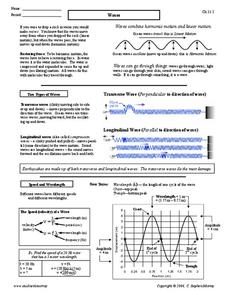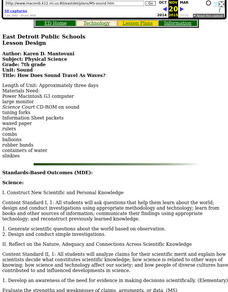Cornell University
Sound Waves
How does sound travel through different mediums? Scholars explore this question by creating and observing sound waves as they learn the difference between transverse and longitudinal wave motion. Using their new knowledge, class members...
Curated OER
Waves
Light waves and sound waves are the focus of this science lesson designed for 5th graders. Besides discovering how these waves travel, learners also discover the basic properties of waves, and analyze data tables and graphs. The...
LABScI
Acoustics: The Sound Lab
If the delay between a sound and its echo is less than 1/10th of a second, the human ear can’t distinguish it. Through the use of a Slinky, rubber band guitar, and straws, scholars explore where sound comes from and how it travels....
Curated OER
Sound
Third graders explore sound. They describe sounds in terms of their properties and explain how sounds are made. Students discuss how various sounds sound to their ears and how sound travels in waves.
Curated OER
Playing With Science
Young scientists investigate the scientific concepts and principles that help make common toys such as hula hoops, yo-yos, slinkies, and silly putty work. As a class, they read "Backyard Rocket Science, Served Wet" to get a look behind...
Acoustical Society of America
Wave Basics
Catch the fast wave. Using a computer simulation, pupils experiment with amplitude, frequency, damping, and tension of a string to determine which affects the speed of the wave. Learners record the observations to determine their...
California Department of Education
What Is a "Wave"?
Take a stretch, but don't wave goodbye. An interesting resource provides everything needed to present an introductory lesson plan on waves. Teachers present a PowerPoint defining the types of waves and their characteristics. Pupils use a...
Urbana School District
Waves
What is a physicist's favorite part of sports? Doing the wave. The presentation covers longitudinal, transverse, surface, and standing waves. It includes in-depth information on frequency, wavelength, period, amplitude, reflection,...
DiscoverE
Slinky® Science
Toys are great for learning about physics. Scholars use Slinky® toys to study Newton's laws of motion and types of energy. After a little play, they then model longitudinal and transverse waves with the Slinky® toys.
Curated OER
From Vibration to Sound
Students observe a series of demonstrations to illustrate wave movement. In this sound wave lesson plan, students witness how objects create waves when dropped in a dish of water, use a rope and slinky to produce transverse and...
Curated OER
From Bats to Babies: Ultrasound
High schoolers research and analyze sound waves and how an ultrasound works to image a baby in utero. They explore various websites, complete worksheets, and write a paragraph describing a demonstration they view in the classroom.
Curated OER
Understanding Waves
Pupils examine the physical properties of waves to explore the word crest and trough. They use toys to study waves in air, water and light.
Columbus City Schools
Making Waves
Learning about waves can have its ups and downs, but a demo-packed tool kit has the class "standing" for more! Learners gain experience with several different wave types, organizing observations and data, and wave...
Curated OER
Sound
Fifth graders explore and examine the basic properties of sound. In pairs, they speak through a balloon and listen to the sound vibrations, and listen to a ticking clock or watch through a variety of materials and identify the...
Curated OER
Wave Motion
Students observe and identify various waves. In this wave motion lesson, student use a Slinky, noise, people, and musical instruments to create waves and observe how each type of wave moves.
Curated OER
Fundamental Properties of a Wave
Students investigate the form and motion of a wave, and examine the fundamental properties of wavelength, frequency, and amplitude. They discuss the fundamental properties of a wave, and in small groups conduct an experiment involving...
Curated OER
Waves
In this waves worksheet, learners read about the different types of waves and how the speed of waves is calculated. Then students complete 5 matching, 8 fill in the blank, and 9 short answer questions.
Curated OER
Waves
In this waves worksheet, students read about harmonic and linear motion in waves as well as the two types of waves. They match 5 terms to their definitions about the structure of waves, they solve for the wavelength, frequency and...
Curated OER
Waves Interference
Students identify different wave types and their characteristics. In this wave instructional activity students complete activities by activating tuning forks and interpreting data.
Curated OER
Interactive Notes - "Sound"
Third graders view a PowerPoint and participate in an experiment about sound. For this sound lesson, 3rd graders press on a slinky with different amounts of force to understand energy waves moving and echoing back. Students discuss...
Curated OER
How Does Sound Travel As Waves?
Seventh graders participate in a number of activities designed to increase their understanding of how sound is generated and how it travels.
Curated OER
Applied Science - Physics (5A) Pre Lab
Fifth graders look at different types of waves. In this wave lesson plan, 5th graders find the difference and similarities of electromagnetic and physical waves. They review the components of waves such as crest, trough, wavelength, and...
Curated OER
Measuring the Speed of a Wave
Students create an experiment in which they measure the speed of a wave and record the data in a graph. They work in small groups to write the procedure for the experiment and share it with another group for cross checking of the...
Curated OER
Under the Ice: Imaging Glacier Bases with Sound
Students investigate with radio waves that are used to remotely sense the topography beneath the ice sheet. They experiment with travel time of waves and convert data to distance and depth. As a result, they develop a profile of the...























